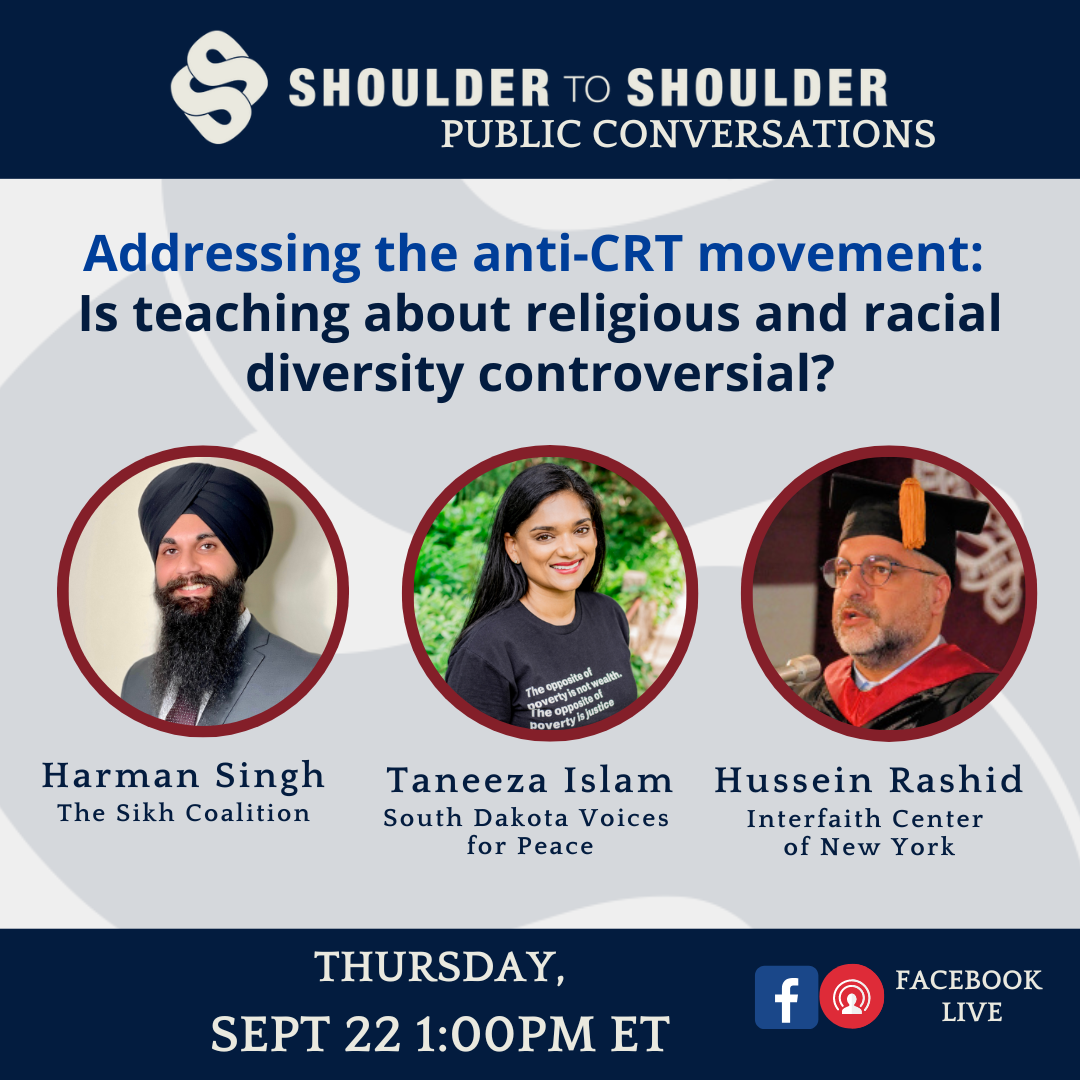What is the anti-CRT (Critical Race Theory) movement and what does it have to do with faith communities? Is teaching about religious and racial diversity now banned?
Join Shoulder to Shoulder for a presentation and panel discussion featuring Harman Singh from The Sikh Coalition, Taneeza Islam from South Dakota Voices for Peace, and Hussein Rashid representing the Interfaith Center of New York on Thursday, September 22 at 1pm ET to learn more about what CRT is and isn’t and what we can do to create communities where all people, regardless of their faith, culture, or background are treated fairly, respectfully, and with dignity.
REGISTER HERE: https://www.eventbrite.com/e/411495864207
Critical Race Theory understands that experiences of racism are both individual and personal as well as political and social. Legal scholars, activists, and lawyers established this theory upon realizing that many of the advancements during the civil rights movement had come to a stop and that some gains were even being reversed. Anti-CRT activists spread disinformation about what is and is not being taught in schools to shut down any conversation about our country’s racial and religious diversity, or the experiences of marginalized communities. The impact of the anti-CRT movement is that teachers and school officials are afraid to teach anything for fear it will be labeled divisive or CRT. Some school officials are receiving death threats and advocacy work to have the school calendar reflect the community’s religious and cultural diversity have been frozen.
The Sikh Coalition, South Dakota Voices for Peace, the Interfaith Center of New York are among a broader community of organizations who have been working for years to improve teachers' access and ability to teach about our religious diversity, abiding by legal requirements and restrictions. Now they have run into significant and in some ways renewed energy with anti-CRT activists pushing for control over school curriculum. We will discuss how are they understanding the movement, strategizing engagement, and thinking creatively. We’ll also explore the roles of local educators, faith communities, and families in continuing to create more inclusive and diverse learning environments.
Speaker Bios:
Harman Singh is the Senior Manager of Education at the Sikh Coalition. He oversees the education program area, including reviewing and creating educational content and resources about the Sikh faith, community, and traditions. He also works to advance the Sikh Coalition’s multi-year advocacy in the area of state standards curricula to ensure that Sikhism is taught in public school classrooms across the United States and that teaching materials are accurate.
Taneeza Islam, Esq., Executive Director of South Dakota Voices for Peace. Taneeza is a first-generation American Muslim immigration lawyer who has called Sioux Falls home since 2012. She began her private immigration law practice in 2013 after receiving a Bush Foundation Leadership Fellowship, and in 2017 she co-founded South Dakota Voices for Justice and its sister organization, South Dakota Voices for Peace.
Dr. Hussein Rashid is a scholar and educator specializing in Muslims in US popular culture and Shi’i justice theologies. He the founder of a religious literacy consultancy, islamicate, L3C, serves on the board of the Interfaith Center of New York, and is currently part of a fellowship of religious leaders developing strategies to combat White nationalism and White supremacy. Dr. Rashid's books include Ms. Marvel’s America: No Normal (co-edited with Jessica Baldanzi), Muslims in North America (co-edited with Huma Mohibullah), and forthcoming The Bloomsbury Handbook of Muslim Popular Culture (co-edited with Kristian Petersen), Teaching Critical Religious Studies (co-edited with Jenna Gray-Hildenbrand and Beverley McGuire), and Muslims in the US (co-authored with Precious Rasheeda Muhammad). He has written articles on depictions of Muslims in film and television, qawwali in the US, the role of Malcolm X in defining UK Muslim identity, representations of Islam in museums, the teaching of Imam Ali, religion and digital humanities, and intra-Muslim racism. He contributed to the Children’s Museum of Manhattan exhibit America to Zanzibar: Muslim Cultures Near and Far, was an executive producer on the award-winning short animated documentary The Secret History of Muslims in the US, and an advisor on the Brooklyn Historical Society’s Muslims in Brooklyn project. He is currently an executive producer for a multi-hour, multi-format documentary on Muslims in the US, called American Muslim Stories, and is working with various museums in the Smithsonian on projects related to religion and sacred arts.

